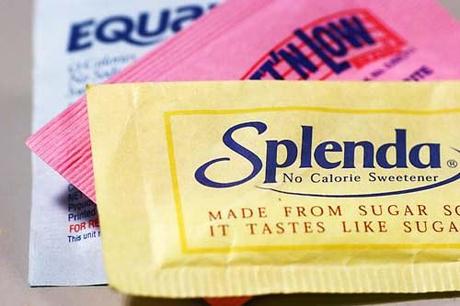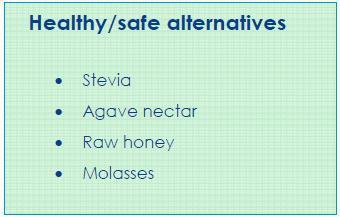
Artificial sweeteners are food additives that replace the use of sugar. They are widely used in about 6,000 products sold in stores, including baked goods, processed foods, sodas and candy, and can even be found in yogurt, baby food and frozen dinners. Because of that, the average American consumes 24 pounds of artificial sweeteners per year (Oz, 2010).

Artificial sweeteners are usually so sweet that they need to be diluted with the bulking agents dextrose and maltodextrin to mimic the taste of sugar. Both dextrose and maltodextrin are caloric, but because the FDA does not require food products with five or fewer calories to be reported on the packaging, “No Calorie” sweeteners are anything but (Bauman & Crystal, 2013). What’s more, our brains cannot differentiate between real and artificial sugar, so these substitutes can still create insulin resistance in the body, which then can lead to weight gain (Murray, 2005).
Popular artificial sweeteners contain aspartame (Equal, Nutrasweet), saccharin (Sweet’N Low) and sucralose (Splenda).
Aspartame is a chemical that is 200 times sweeter than sugar. Its presence in soda is significantly contributed to kidney function decline and can turn into methanol in the
digestive tract. It is considered one of the most dangerous substances on the market that is put into food and can cause headaches, seizures, breathing problems, anxiety and weight gain (Bauman & Crystal, 2013).
Saccharin is a sulfa-based sweetener that was found to cause bladder cancer in rats in early safety studies. The USDA has tried, and failed, to ban the substance in the past and the FDA no longer requires a carcinogen warning label on the package (Saccharin, n.d.). Because of safety concerns, it is not recommended for use during pregnancy (Murray, 2005).
Sucralose is a synthetic additive that is created by chlorinating table sugar (chlorine is a carcinogen). There has never been any long-term study on its effects, but research has shown that it can reduce the amount of healthy intestinal bacteria in our bodies (Bauman & Crystal, 2013), and can cause stomach cramps, inflammation and skin irritation (Murray, 2005).

Sources:
- Oz, M. (2010, October). Artificial Sweeteners And Other Food Substitutes: Dangerous to Your Health. http://www.doctoroz.com/videos/artificial-sweeteners-and-other-food-substitutes-dangerous-your-health
- Bauman, E and Crystal, C. NC101 Eating For Health. Foundations of Nutrition, Penngrove, CA: Bauman College.
- Saccharin (n.d.) Retrieved from Wikipedia: http://en.wikipedia.org/wiki/Saccharin
- Murray, M. (2005). The Encyclopedia of Healing Food. New York: Atria Books.
Molly Pappas
In a Nutshell Nutrition I [email protected]


